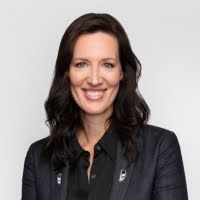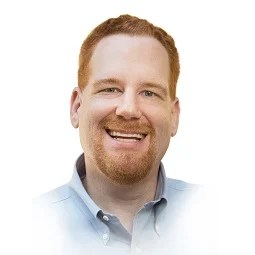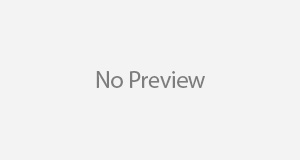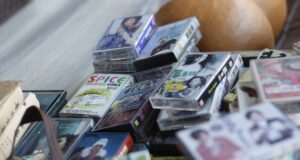
Jodi Wellman is the founder of Four Thousand Mondays, a speaker, author, and assistant instructor in the Master of Applied Positive Psychology program at the University of Pennsylvania. Jodi’s TEDx talk is called How Death Can Bring You Back to Life; with over 1.3 million views, it is the 14th most-watched TEDx talk released in 2022, out of 15,900! Check her book out, too… “You Only Die Once: How to Make It to the End with No Regrets.”

Our host, Gabe Howard, is an award-winning writer and speaker who lives with bipolar disorder. He is the author of the popular book, “Mental Illness is an Asshole and other Observations,” available from Amazon; signed copies are also available directly from the author.
Gabe makes his home in the suburbs of Columbus, Ohio. He lives with his supportive wife, Kendall, and a Miniature Schnauzer dog that he never wanted, but now can’t imagine life without.
To book Gabe for your next event or learn more about him, please visit gabehoward.com.
Producer’s Note: Please be mindful that this transcript has been computer generated and therefore may contain inaccuracies and grammar errors. Thank you.
Announcer: You’re listening to Inside Mental Health: A Psych Central Podcast where experts share experiences and the latest thinking on mental health and psychology. Here’s your host, Gabe Howard.
Gabe Howard: Hey, everyone, welcome to the show. I’m your host, Gabe Howard. Calling in today, we have Jodi Wellman. Jodi holds a masters of Applied Positive Psychology from the University of Pennsylvania, and her TEDx talk, How Death Can Bring You Back to Life, has over 1.3 million views. Her book, “You Only Die Once: How to Make It to the End with No Regrets” is out now. Jodi, welcome to the podcast.
Jodi Wellman, MAPP: Oh thanks Gabe. I am stoked to be here to spend this time with you.
Gabe Howard: I’ve never heard anybody describe talking about death as stoked. I
Jodi Wellman, MAPP: [Laughter]
Gabe Howard: Want to be really honest. Like we’ve done grief on this, this podcast before. We’ve not shied away from death,
Jodi Wellman, MAPP: Yeah.
Gabe Howard: But it’s always done sad. And
Gabe Howard: Your energy is like really high end. You’re like, yeah, let’s talk about death.
Jodi Wellman, MAPP: Yes, yes, if I had, I call myself the Grim Reaper’s cheerleader. And you know I have no rhythm. I couldn’t do a cheer to save my life. But I really want to get black pom poms just for, like, visual effect. To be
Gabe Howard: I love it, I love it.
Jodi Wellman, MAPP: Like, guys, be not afraid. He’s here to actually be the right little kick in the butt we need. So. Yeah. Oh, yeah. I’m raring to go. Like. Like, let’s make this a, like, a little mortality party.
Gabe Howard: Now, now, when you say the Grim Reaper is the kick in the butt that we need, it conjures up this idea that you’re saying, wait, so the Grim Reaper comes, takes you away. You’re dead now. And that’s the kick in the butt you need. But that’s not what you mean, right?
Jodi Wellman, MAPP: Exactly. Yeah. That would be the ultimate kick. Not so fun. Not so good. No pom poms on that at that point. This is about ushering the Grim Reaper into our lives now. Being willing to talk about it and saying, wait a sec. If we do tune in to the unfortunate sucks to be true truth that we are temporary, could that be the thing that helps us snap out of this autopilot we’re in, and helps us stop taking life for granted and makes us go, Holy cow! Like this really is a countdown. Maybe I should get on with some of those ideas I have for my life is we need that right?
Gabe Howard: One of the things that reminds me of is all of my projects that have deadlines get done, all of my projects that are like, I’m going to do this, don’t get done. I’ve been writing the same book for a decade. There’s no deadline. There’s nobody reaching over me. There’s nobody telling me to finish it. There’s no. If you don’t get it done by this date, a bad thing will happen. Is that what you mean?
Jodi Wellman, MAPP: Gabe, you are on it, right down to the language. You don’t even know you said it. But when you said deadline, you’re speaking my language because it is like we need the ultimate, ultimate, ultimate deadline of life. Because we’re procrastinating. Like, this is the most meta procrastination that goes on. It’s like we lull ourselves into this idea that I’ll have time later and later to me, is like just the most dangerous word. And I recognize we have to pace ourselves. This is not about stuffing everything into this week, but you’re right. If we aren’t aware of this sort of sense of finality, we do just tend to push out our existence. And that again, is the danger, because how many times have you said, well, first of all, you’ve got a book you’ve been kind of dragging out a little bit. I want to hear more about that.
Gabe Howard: For a decade. For a decade, it’s been dragging on forever. I got every excuse in the book, don’t you worry.
Jodi Wellman, MAPP: Oh, well, should we count how many Mondays you have left? Might that be this sort of poke in the ribs, maybe.
Gabe Howard: Okay, let’s talk about that. You use the phrase, should we count how many Mondays you have left? First off, I want to count how many Fridays I have left. Fridays are just way superior to Mondays. But it’s not my thing. It’s yours. So? So how
Jodi Wellman, MAPP: Okay.
Gabe Howard: Many Mondays? What do you mean by that?
Jodi Wellman, MAPP: Righto. Okay, well, we roughly get 4,000 to start with. That’s like the average lifespan. And that’s why I called my company 4,000 Mondays. There we go.
Jodi Wellman, MAPP: And so when I look at this whole idea again, the science is called temporal scarcity. And that is this notion that whenever we recognize there is a thing, an experience, an item, a diamond, a pumpkin spice latte, whatever it is, when we know that it is limited, when we know that it won’t be around forever, our perception of its value absolutely increases. And so that’s exactly what we’re doing with our lives, is that we say, wait a sec, I’ve got 4,000 roughly to play with. I don’t care so much about how many I’ve used. I know I was there, I did them, I want to know how many I have left because this taps into that sense of scarcity. And so for me, for example, it’s 1,830 that I have left, and I count that every Monday pretty darn vigilantly because we need that extra reminder. And that’s the thing that, for many of us, can be the provocation to say, oh, and let’s recognize from like 1,830, I ain’t going to be too sharp near the end of those, right? So if I’m writing another book, I’m probably not going to bank on, you know, the best, the best years being, you know, I don’t have that full runway. But that’s the thing that can motivate us to get on with living with that sense of urgency and intention.
Gabe Howard: Wow. When you said 1,800, I forget. How many Mondays
Jodi Wellman, MAPP: Yeah.
Gabe Howard: Do you have left?
Jodi Wellman, MAPP: 1,830.
Gabe Howard: All I could think of is that’s. That’s less than half. Like, Immediately I was like, oh no.
Jodi Wellman, MAPP: Yes. Thank you for that. That’s very true. I’m on the downward slope. And another way to just rankle us, because I am here just to slightly rankle. Like I want us to experience a twinge of an existential crisis, but not like a full blown, you know?
Gabe Howard: That’s fair, that’s fair. Thank you, thank you. I can’t handle a full blown. But
Gabe Howard: I think a twinge is probably good for me.
Jodi Wellman, MAPP: A twinge. Yeah. You have to pay extra for the full blown one. So that’s not happening today. So this like little. Ooh. Another way to grip is when you count how many Mondays you have left in your career. So for some of us, that’s like, please, that cannot come soon enough. You know, like, please tell me it’s 19 Mondays left, but that’s another story. It’s like, let’s maybe work on changing it so that you enjoy those Mondays, but for the rest of us who are generally maybe liking what we do, and we’re finding it kind of animating and invigorating, sometimes that can be another wakeup call about, wait a minute. Like I think the last time I did it. I don’t do this, this one regularly, but I think I counted and I’m really going to retire. I mean, how could I stop doing this, right? The Grim Reaper is not stopping. He’s not going to. He’s not going to fire me. I think I had something like 642, and I remember doing that math and going, whoa, like, that is not enough time to carry forth this mission that I feel called to do. And so sometimes these are the ways we can play with the math to help motivate us.
Gabe Howard: Wow. So I need to figure out how many Mondays I have left. How do I do it?
Jodi Wellman, MAPP: Okay. Well, first and foremost, the resources page on my website has a calculator because you do not have to spend your precious minutes doing math. But roughly, if you’re a man, you’d start with 78 and minus your age,
Jodi Wellman, MAPP: And then you’d multiply that by 52.
Gabe Howard: Okay, so the first thing that I’m going to do is open up a calculator app.
Jodi Wellman, MAPP: Yep. Do it.
Gabe Howard: Okay, because, because that’s that’s that just seems the right
Jodi Wellman, MAPP: Yeah.
Gabe Howard: Idea. Okay. So I take 78 minus?
Jodi Wellman, MAPP: Yep. Minus your age.
Gabe Howard: So that gets me to 31.
Jodi Wellman, MAPP: Times 52 weeks a year.
Gabe Howard: Times 52 weeks a year, which is 1,612.
Jodi Wellman, MAPP: How does it feel to see that number?
Gabe Howard: It terrible because I also know that it’s lower because I’m this isn’t my birthday. Right. So my birthday is November 24th. So when I factor in you know, there’s another oh wow. There’s another like I mean even if we just do like six months ago I turned 47. So, you know,
Jodi Wellman, MAPP: Yeah.
Gabe Howard: Even if we just do half of a year, which is 26 weeks, I’ve got a minus that from that number. So I’m actually like to 1,586.
Jodi Wellman, MAPP: Yeah, yeah.
Gabe Howard: That’s terrible. I’ve got no time left.
Jodi Wellman, MAPP: Wait a sec. How’s a book looking right now, Gabe?
Gabe Howard: Yeah. It looks like I need to like, write it immediately.
Jodi Wellman, MAPP: Should we quit this conversation right now so you can go back to your draft? I mean, I feel urgency.
Gabe Howard: I mean, I do feel urgency, but I also have so many more questions because this blows my mind. How does this not cause a panic? I’m.
Gabe Howard: Because I’m as I’m sitting here, you know, like like you said, you’re not trying to cause a full-blown existential crisis. Just just
Jodi Wellman, MAPP: Yeah.
Gabe Howard: Just trying to nudge me a little bit. But as I’m sitting here thinking I’m like 1,586, there’s nothing left. There’s no time. Oh my God, I’ve wasted everything and accomplished nothing. So I’m like, teetering to the negative. But I’ve got you here.
Jodi Wellman, MAPP: Yeah.
Gabe Howard: Push us back over to the positive.
Jodi Wellman, MAPP: Yeah I’m going to just like come on back in. Let’s have like a nice comforting hug. Most people. Yes. Your experience is normal right. It’s meant to make your eyes widen. But because this is not news right. Like nobody here is experiencing new news today that your time is up. But we’re just very used to talking about it in years. And even then we do a very good job of not talking about it, which is really why how we get ourselves to be honest, into this mess of taking life for granted is that we prefer not to talk about it. We can talk about retirement as a fuzzy notion, but we don’t want to talk about the end. But we understand that, that it’s coming. I’m just making it more granular. And so for most of us, even though it’s an uncomfortable feeling and it can do that thing where it makes you feel like, wait a sec, you you took it to an interesting place to which might be for dramatic effect, which I appreciate was like, wait a second, I’ve, like, wasted all my time. And that’s where I like to play to. Because number one, I think the truth is, most of us are not going to jump off the edge because the math made it clear. It’s like all we’re doing is slicing and dicing it differently and trying to create a reaction which is actually healthy. So appreciate any fear you’re experiencing or anxiety. Yes. Sit with it and embrace it. You know, like that’s important is to soak that in.
Gabe Howard: So you really embrace memento mori, which is. It’s a philosophical thing, but it’s a Latin phrase that means remember, you must die.
Gabe Howard: And in philosophy it’s like, remember, you must die. So get busy living. It sounds like you embrace that on steroids.
Jodi Wellman, MAPP: It is a little bit juiced up. Yeah, it is exactly that. That is the ethos. So just to be super clear, it is not remembering we’re going to die so that we can just be dour and have a really morbid conversation and talk about how well that sucks. You know, I grew up and my mom had a button that she wore on her lapel, like on her acid washed jacket, and it was like, like life short. And then you die or like, life sucks and then you die.
Jodi Wellman, MAPP: It doesn’t have to be. We’re not talking like that. No, this is about remember that you’re temporary so that it does help you to refine what your priorities are, and it does help you to feel a little bit more of that sense again, of maybe that intensity and urgency to say, if I only have this much time, I’m going to make the decision that these things maybe are not as important and these things are more important and gave the best, best scenario. I see this is one of the chapters in the book, is about people who’ve had wake up calls, and I don’t know if you know anybody, maybe, you know people who have had a precipice moment, like a brush with death, Near death experience. Maybe it’s a diagnosis that thankfully they’re in remission. For or not, they are. Their eyes have been opened in ways that we just don’t see the rest of our lives. Right? Because they they now know what they had to lose because they saw it. And they’re living lives and they you know, there are so many lessons that are based in research, everything I’d like to talk about as much as I goof off. It’s empirically based because, you know, feels legit is that they have this refined sense of that’s stupid stuff that I was caring about, doesn’t matter anymore. Like, I don’t have to say yes to every time I’m asked to take part in this thing in the community or this thing for a volunteer, whatever it is, I don’t have to. I can say no because they now recognize their time is more important. The choices they want to make that align with their values. Same thing with the right people that you want in your life. Same thing with the activities you choose to take part in. Same thing with the goals you make a plan to pursue versus put on ice. Because that ice, I mean to be honest, that’s just like that to me. Sounds a lot like the morgue, right?
Gabe Howard: Oh, yeah. Yeah. And it’s an apt analogy. Put it on ice. Right.
Jodi Wellman, MAPP: Yes. Yeah.
Gabe Howard: So it really works. Now, all of this led you to create the astonishingly alive model for
Gabe Howard: Living. Can you share that with our audience?
Jodi Wellman, MAPP: Well, thank you, first of all, for dredging that puppy up. I love
Jodi Wellman, MAPP: This. This to me is this is where, like, the nerd factor gets explosion-ary. And I love it. And it’s a framework for looking at our lives. Okay, so I look at life like, yeah, we want to live longer. Sure. Of course. But most of us would agree that it’s not about the length because it’s like, well, what what’s the quality of my life? So now we’ve got a different we’ve got the dimension of living wider and deeper, and you live wider when you add more vitality into your life. And that’s the fun stuff. It’s like the traditional definition of happiness. It’s going out and having the new going to the new restaurant or going on that cool road trip, having fun, having a party, playing a game. It’s the good fun stuff like, yes, check, I want it. So that’s wider with vitality. And then there’s living deeper with meaning. And that is just a tad more about doing good rather than feeling good. It has to do with having a sense of meaning and purpose connection. Maybe it’s spirituality, but it’s a quality relationships, like the depth of life, you know? And when you just put that stuff together, any time you are plus on vitality, on the scale, and any time you’re plus on meaning on the scale, you’re in the quadrant, which is like our Mecca for life, which is living astonishingly alive lives.
Jodi Wellman, MAPP: And it doesn’t need to be flashy or showy, you know, it doesn’t have to mean that you’re, like, glitzy and, like, going on south of France trips, and you’ve got the best of everything and the best handbag or whatever, I don’t know, who cares? Your version of an astonishingly alive life could be just beautifully sweet and simple. Or it could be. It could be flashy. That’s fine. If that’s you flash it up. I don’t know, whatever floats your boat, but we just owe it to ourselves to look at our lives and go, wait a minute. How am I doing on vitality? Do I need more of that? And or how am I doing on meaning? Do I want more of that? And then we just. Then, then now we have an action plan to pursue.
Gabe Howard: Now I want to give just a little pushback. Just just ever so slightly. We’re friends though, so it’s okay. But a little bit of this rings like I’m having financial problems and somebody says, I got the solution, make more money. So but but then the next question is, of course how do I make more money? So you’re at this precipice, you’ve realized it. You want to be astonishingly alive. How do you find that meaning? How do you gain that vitality?
Gabe Howard: And we’re back with Jodi Wellman, author of “You Only Die Once: How to Make It to the End with No Regrets.”
Jodi Wellman, MAPP: So most of us are find ourselves either in any of the other quadrants which I won’t bore you with, but meaningfully bored is where most people find themselves.
Jodi Wellman, MAPP: So that’s where, like they are, they’ve acknowledged they have enough meaning in their life, but they’re just bored because they haven’t maybe sparked up their social life enough lately, or gone out to concerts or whatever it is that makes them feel alive. Now we’re talking about real specific realities and problems, and most of us are just asleep at the switch because we’ve just gotten ourselves sort of glazed over into a routine of living our lives where one week leads into the next and then into the next month. And so the recommendation here, as seemingly simple as it sounds, is if you’re thinking, for example, that you need more vitality in your life, what makes you feel alive? What makes you feel like, wow, I’m having a good time, and most adults actually have a hard time even answering that. And that’s the first step, is acknowledging because you’re just so busy, or you just kind of lost the plot on what it takes to feel alive again. But the first step is to identify what are those things that are very, very quick and easy things like, oh, if I walk my dog by the lake, I tend to feel I feel great. Or the big things, like when I was taking those taekwondo lessons, I was really proud of myself and I felt really fit and amazing and energetic.
Jodi Wellman, MAPP: And it was really fun. Okay, well, most of us, though, we fall off the wagon with some of the activities that once brought us joy and some sort of sense of, like, joie de vivre. So this is an act of being conscious and scheduling the life that you might love to live. And most of us, again, this is this is it sounds it does sound basic, but in the work I do in working with individuals and groups, it’s kind of an epidemic, you know, where we’ve just let ourselves kind of languish and we have forgotten about. Oftentimes it’s our recreation life. Or oftentimes it is maybe it is our social life or it is our health, or it is an area where if we just tune into it, diagnose the dead zones, I call it, diagnose where you’re feeling flatlined and pick one small thing. I’m kind of fanatical. This is not about major life overhauls. This doesn’t mean you have to quit your job and move to Thailand. Although I would not stop you if you chose to do that. But this is about. Wait a minute. Maybe I should register for that eight week learn how to do pottery course that I was kind of curious about. That’s a choice to live wider, right?
Gabe Howard: That’s incredible. One of the things that you talk about is being on autopilot. And as I was
Jodi Wellman, MAPP: Yeah.
Gabe Howard: Listening to you speak, I was like, well, this is just autopilot, you know, get up, do the thing, go to bed, rinse and repeat, rinse and repeat. Rinse and repeat. How do you get off autopilot? Because I think you’re right. I think the vast majority of people are just a slave to their habits, a slave to their routines. They’re just on autopilot.
Jodi Wellman, MAPP: Yeah. Oh, yeah. Yeah. I have a really contentious attitude towards habits, and clearly we can keep the good ones in our lives, like bathing and, you know, for me, like calling my dad Monday, Wednesday and Friday. That’s a habit that helps, you know, keep relationships intact. So those are okay things, right? However, our autopilot situation comes in when we are mindlessly engaging in routines that allow us to help keep life feel organized. And I’m not here again to say, like, every day needs to be a new novel carnival, because I don’t think we could handle the stimulation, but the recommendation is look at the life you’re living and see where you can just shake it up a bit like a snow globe. Where can you take one small routine and maybe shake it up this week? Like for example, do you do the same breakfast every morning?
Gabe Howard: I do, I do, I do. Yeah, it’s Diet Coke. I mean, it’s a terrible breakfast, but it is, in fact the same one every morning.
Jodi Wellman, MAPP: [Laughter] I love this.
Gabe Howard: I have the same morning routine. Get up, drink Diet Coke.
Jodi Wellman, MAPP: Okay, okay. And it may be working for you, right? That may be the thing that helps charge you up. All right. Maybe we don’t mess with the Diet Coke. And especially if this episode is sponsored by Coca-Cola. But what that might look like is trying something just a little bit different for one of the days, right? And maybe, maybe for you, it’s maybe it’s switching it to, like, Diet Mountain Dew one day. Or maybe it is just trying a very different meal entirely. Or maybe it is, for example, just to insert other things for listeners. It’s like you might have the routine of a date night that is just sort of the same old, same old, and it’s fine. But what would it take to spice it up? What would it take? If you order a normal Friday meal, what would it take to just try something different? What would it take to drive the different way home? What would it take if you normally do some kind of a workout? If you’re like today I’m going to do that aerial yoga thing which actually would terrify me, but maybe like just taking the things that we have on routine because routines to me are that’s the scare. It’s that that’s the stuff that glazes our eyes over. And that’s where I think we need to be vigilant and say, every now and then I need to shake it up. Because novelty is so important for our experience of feeling alive, just in little doses, too. We don’t have to again, make a make our lives just a total whirlwind. That, to me, sounds just exhausting.
Gabe Howard: I think that is where people get in trouble, though, right?
Jodi Wellman, MAPP: Yeah.
Gabe Howard: They’re bored with their lives and they think, okay, well, I need a divorce or I need a new job or I need to completely redo everything. And your
Gabe Howard: Advice is take a pottery class?
Jodi Wellman, MAPP: Oh it is. And I love how reductive that sounds, because it’s so hilariously, perfectly on point. It’s that we are. We do we go, like, ditch to ditch, you know, we’re like all or nothing. Like, oh my gosh, I found myself in this slump. I was just like, I used the expression before asleep at the switch. But it’s like I’m just letting my life kind of like, carry me down the lazy river. And instead of having to press the detonate button, which does, does blow things up in ways that maybe are irreparable. I think we’ve lost the plot. And let’s go back to what are the things that maybe used to bring you joy? That’s number one, because most of us also feel like we have to reinvent the wheel, even if we are going to try and not necessarily quit the job or divorce or file for bankruptcy and do the big thing, sometimes it’s just. Wait, wait, wait. What brought you enjoyment before? Was it volunteering when you used to go to the library and read to those kids, and you know what you could be like? Yeah, I don’t even know why I stopped. It doesn’t matter. You did. And now, like, what would it take to maybe just do it again, maybe even just every other week? Because those things that allow us to feel engaged in our lives, it’s literally about engagement. It’s literally about the sending signals to ourselves that we are participating in our own lives, that we’re being active and that we’re not being passive and just watching the years pass us by and then seeing what’s next on Netflix. And I love Netflix, by the way. So nothing against Netflix.
Gabe Howard: I was going to say I was getting ready to defend Netflix
Jodi Wellman, MAPP: I love it.
Gabe Howard: With like full. I’m glad that you love it too, but sometimes it is okay, right? I mean, it’s it’s okay to like, sit watch Netflix and just, you know, chill, but
Gabe Howard: Just don’t make it your every day. Try, try to mix it. I believe you said novelty is the spice of life.
Jodi Wellman, MAPP: Yes. Literal spice of life. Yeah. Thank you for because I have this, like, little corny thing. I call it, like living a squander free life.
Jodi Wellman, MAPP: So like, okay, squandering is very different from chilling out. So I love to chill out. I have a well-earned dent in my couch from chilling out from my behind, where I just love to be there. It helps me relax from the day, but many of us have that sense when we’re taking the hanging out, restoring after, oh, it’s been a busy day. Sometimes we are aware if we actually pay, if we’re honest, that niggling sense that, oh, maybe, maybe like seven nights a week. This isn’t necessarily the life I would love to live. Maybe I could do this five nights a week, or maybe 5.5 on average, and maybe for another night or a night and a half. We could, like last night. This is a big deal because I’m a homebody, okay, I love, I love, as discussed, Netflix, Hulu. I’m watching it all. But last night it was like, what if we went to that cool bar and had a martini? And so we just did that and then came home and watched our shows. And that was a spice of life that we needed to feel I am an active. I get out there, look at me, we did a thing and we had fun and it was just unexpected. And it was ridiculously expensive, which is just, let’s just vent about that for a second. But you know what? It was worth it to have this experience. Just a tiny little thing. And this is exactly what I’m saying. Does one martini every three weeks help to make life? I mean, you know, it shouldn’t be using alcohol as an example, but we’ll flow with it. It’s a you can substitute
Jodi Wellman, MAPP: Whatever floats your boat. Yeah.
Gabe Howard: Have the dessert sometime? Buy the popcorn at the movie theater. Do the little extra thing.
Jodi Wellman, MAPP: Oh, that’s a really cool blog post idea. Thanks. Do the extras.
Gabe Howard: You’re welcome. You’re welcome. And you can have it for free. I won’t even No, no, no. Content creator contract needs to be entered into.
Jodi Wellman, MAPP: I will, I will, I will credit you though. Thank you.
Gabe Howard: Jodi. Thank you, thank you, thank you so much. Where can folks find you on the web? Where can folks find your book? Tell us everything we need to know to contact you.
Jodi Wellman, MAPP: Thank you so much for asking. Okay, so I’m over at FourThousandMondays.com. And there’s a quiz you can fill out to find out how dead or alive you are, which is fun. And then the book, it is “You Only Die Once: How To Make It to the End with No Regrets.” There’s conveniently a page on my website called books, or you can just google it and then you should be able to find it and live, you know, happily ever after until you die.
Gabe Howard: Thank you so much, Jodi, for being here.
Jodi Wellman, MAPP: Thank you for having me.
Gabe Howard: You are very welcome, Jodi. And I want to give a great big thank you to all of our listeners. My name is Gabe Howard, and I’m an award winning public speaker who could be available for your next event. I also wrote a book. It’s called “Mental Illness Is an Asshole and Other Observations,” which you can get wherever they sell books. But if you want a signed copy with free show swag, or you want to learn more about me, just head over to gabehoward.com. You can also find me on TikTok and Instagram @AskABipolar. All right, I need a couple of favors. The first one, wherever you downloaded this episode, please follow or subscribe to the show. It is absolutely free and you don’t want to miss a thing. The next one is recommend the show. Share your favorite episode on social media. Bring us up in a support group. Hell, send somebody a text message because sharing the show with the people you know is how we’re going to grow. I will see everybody next time on Inside Mental Health.
Announcer: You’ve been listening to Inside Mental Health: A Psych Central Podcast from Healthline Media. Have a topic or guest suggestion? E-mail us at [email protected]. Previous episodes can be found at psychcentral.com/show or on your favorite podcast player. Thank you for listening.




